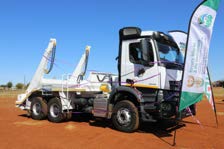Multi-million waste fleet to wrestle municipal litter
Multi-million waste fleet to wrestle municipal litter LondekileThe vehicles include skip loader trucks, front end loaders, compactor trucks and other trucks required to transport waste within the municipal area.
“Our municipalities are struggling to provide regular and consistent waste collection services. Once dumpsites develop, these are not regularly cleared and a number of our landfills do not meet regulatory compliance standards,” says Forestry, Fisheries, and the Environment Minister, Ms Barbara Creecy.
The National Waste Management Strategy was revised in 2020 and focuses on: improving household waste collection; diverting waste from landfills; promoting a circular economy and promoting community awareness of the effects of illegal dumping on their own health and on the environment.
“To improve waste management in municipalities, the department is assisting in the development of their integrated waste management plans, and training on sustainable waste management practices,” says Minister Creecy.
Among the greatest threats to the health of the environment and people is waste pollution. “Throughout our country, we are plagued by littering, illegal dumpsites and the scourge of plastic waste that enters our river systems, our wetlands and ultimately our Oceans,” says Minister Creecy.
While the country has made significant strides in improving waste Management since 1994, almost a third of households still do not have regular weekly household waste removal services. Households are sometimes forced to find their own solutions to waste management …solutions that are often damaging to the health of communities and the well- being of the environment.
The National Waste Management Strategy was revised in 2020 and focuses on: improving household waste collection; diverting waste from landfills; promoting a circular economy and promoting community awareness of the effects of illegal dumping on their own health and on the environment.
“To achieve the goals of this strategy all of us must play our part: national and provincial government must support municipalities to develop local integrated waste management strategies. We must ensure our landfills comply with the regulatory environment and waste does not leach into ground water or into the soil. We must invest in the yellow fleet and every year we must ensure more and more homes have access to safe waste disposal,” says Minister Creecy.
Government has set up the regulatory environment for extended producer responsibility schemes to promote re-cycling in the packaging, electronics and lighting industries with recent regulations gazetted for new sectors such as used oil and pesticides.
The regulations for organic waste treatment, and organic waste composting, have also been published for implementation in order to divert waste away from landfills and create new industries.
“Communities must begin to separate their waste at home so that waste reclaimers can undertake their work in a dignified manner.
Households must teach family members not to litter and must work with their neighbours to prevent illegal dumpsites. All of us must participate in regular clean up campaigns to beautify our communities and protect our environment,” says Minister Creecy.
In addition, the Department has also co-operated with National Treasury and the Department of Cooperative Governance and Traditional Affairs (COGTA) to change the Municipal Infrastructure Grant Policy so that municipalities can access the grant to fund their yellow fleet.
“Government and the private sector must work with waste reclaimers so that we build a dignified waste, reclaiming industry that promotes waste diversion from landfills, promotes the circular economy and gives a decent livelihood to the tens of thousands of men and women who do the daily back-breaking work of the recycling industry,” urged Minister Creecy.